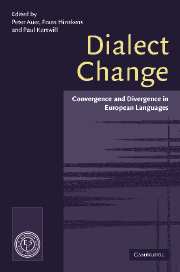Book contents
- Frontmatter
- Contents
- List of maps
- List of figures
- List of contributors
- Preface
- Map
- 1 The study of dialect convergence and divergence: conceptual and methodological considerations
- Part 1 Convergence, Divergence and Linguistic Structure
- Part 2 Macrosociolinguistic Motivations of Convergence and Divergence
- 6 Processes of standardisation in Scandinavia
- 7 The birth of new dialects
- 8 Dialect convergence in the German language islands (Sprachinseln)
- 9 Political borders and dialect divergence/convergence in Europe
- 10 The influence of urban centres on the spatial diffusion of dialect phenomena
- Part 3 Microsociolinguistic Motivations
- References
- Index
6 - Processes of standardisation in Scandinavia
Published online by Cambridge University Press: 22 September 2009
- Frontmatter
- Contents
- List of maps
- List of figures
- List of contributors
- Preface
- Map
- 1 The study of dialect convergence and divergence: conceptual and methodological considerations
- Part 1 Convergence, Divergence and Linguistic Structure
- Part 2 Macrosociolinguistic Motivations of Convergence and Divergence
- 6 Processes of standardisation in Scandinavia
- 7 The birth of new dialects
- 8 Dialect convergence in the German language islands (Sprachinseln)
- 9 Political borders and dialect divergence/convergence in Europe
- 10 The influence of urban centres on the spatial diffusion of dialect phenomena
- Part 3 Microsociolinguistic Motivations
- References
- Index
Summary
Viewed from abroad, the three mainland Scandinavian countries of Denmark, Norway, and Sweden are rather similar. They are modern welfare states with ethnically and culturally homogeneous populations that have only recently seen substantial immigration from overseas. Their languages are related and to a great extent mutually intelligible, but as far as language standardisation is concerned there are considerable differences. As we shall see, Danish is one of the most standardised languages in Europe. Swedish standardisation comes close to this, whereas that of Norwegian has taken a very different path.
This chapter will focus on standardisation of spoken language in mainland Scandinavia. It will be based on an analysis of the standardisation process in Denmark, and will attempt to disentangle the interplay between ideological, political, demographic, social, and educational reasons why the standardisation of spoken Danish is as advanced as it is. Besides standardisation, the notions of convergence and divergence (cf. Auer and Hinskens 1996: 1ff.) will be used to refer to internal developments affecting the structure of both dialect and standard varieties.
‘Standard Language’ and ‘Standardisation’
The modern tradition of language standardisation studies begins with the Prague School. Characterising the nature of a standard language, they drew attention to the special range of functions in which it was employed, as well as the direct connection with urban culture and civilisation (Joseph 1987: 13). According to this view, we may consider the presence of a standard language to be a major linguistic correlate of an essentially urban culture.
- Type
- Chapter
- Information
- Dialect ChangeConvergence and Divergence in European Languages, pp. 171 - 195Publisher: Cambridge University PressPrint publication year: 2005
- 9
- Cited by



